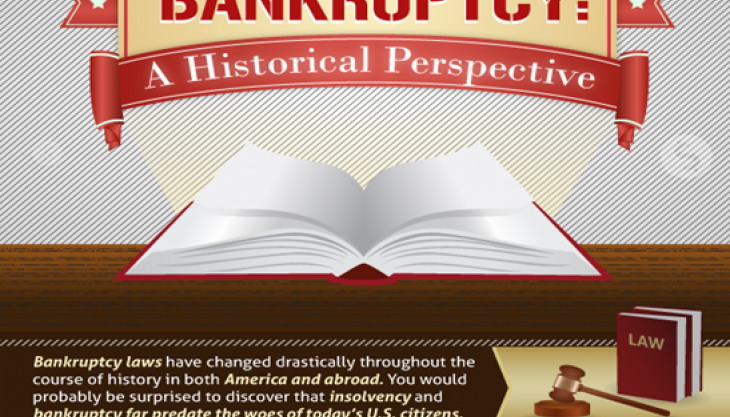A Fresh Start: Lessons From the History of Bankruptcy
Submitted by Rachel R on Thu, 01/10/2013 - 11:50am

Bankruptcy may seem like a modern invention, and while the laws governing it in the United States are relatively recent (and substantially changed in 2005), bankruptcy has been around for a long, long time. Getting the long-range historical view of bankruptcy can help you put your own bankruptcy filing in perspective. Here’s a look at the evolution of bankruptcy law, and how it’s helped share the modern legal practices we follow today.
Biblical Bankruptcy: A Fresh Start. In the Book of Exodus (the second book of the Bible), charging interest on loans was highly frowned upon (see chapter 22, verses 25-27). In the fifth book of the Bible (Deuteronomy), the first two verses of the 15th chapter lay out specific instructions that any debts were to be completely forgiven every seven years, resulting in an automatic fresh start for those in debt.
In US bankruptcy law, individuals may make a filing every eight years. Later in that same chapter, more instructions are laid out that say you can’t send debtors away empty-handed after forgiving their debt. Even in biblical times, there was the notion that debtors should be allowed to retain some of their property. In US bankruptcy law, this is mirrored in the federal and state homestead exemptions that allow a certain amount of equity in your home to remain protected in bankruptcy. There are also options that allow you to keep other personal property and your vehicle as well.
Image source: visual.ly
Early Bankruptcy Practices were Harsh. The word bankruptcy actually comes from Italy’s practice of the banca rotta or broken bench. The workbenches of indebted tradesman who could not pay their debts were often broken as punishment. The Roman Empire was quite harsh in its dealings with debtors.
Assets could be seized by creditors and the debtor essentially had no civic rights in the process, although they could voluntarily give up their assets through a magistrate. You can have the peace of mind when you file for bankruptcy that you have the protections offered by a comprehensive set of logical, citizen-minded laws that treat your situation as fairly as possible.
Image source: visual.ly
Prison and Death: Severity in the Middle Ages. As cases of insolvency grew during the Middle Ages, particularly among merchants, governments throughout Europe instituted severe penalties for bankruptcy that went far beyond the mere forced liquidation of estates.
It was during this time that the debtor’s prison became common, where many men and women would be locked up in the same cell until their families paid their debts. Many died while waiting. Clearly, this was the low-point in bankruptcy and human history. Such practices could never happen in the US today.
A Kinder, Gentler Approach to Bankruptcy in the US. Beginning around 1841, laws were developed around voluntary insolvency that evolved into the bankruptcy laws we have today. The Bankruptcy Acts of 1867 and 1898 were the ones that allowed citizens to entirely eliminate their debts through bankruptcy filings. In 1978, greater flexibility was created with Chapter 7 and Chapter 13 types of filings. Some tightening and restrictions did come in 2005 that made filing a bit more difficult and expensive, and also opened the door for creditors to force debtors into involuntary bankruptcy. Compared to the early days of bankruptcy, however, modern laws are both just and fair.
Image source: visual.ly
A look at the history of bankruptcy can help put your current or recent struggles into perspective. From Biblical times to today, individuals have dealt with complicated financial situations. Today’s system allows for a fair and balanced approach to regaining your financial footing during difficult times.
Dedicated to helping residents of North Carolina find the best solutions to their debt problems. Don’t waste another day worrying about your debt. Call +1-833-627-0115 today to schedule a free initial consultation to discuss your bankruptcy options.
Debts Hurt! Got debt? Need help? Get started below!
Serving All of North Carolina
- Bankruptcy Attorneys Raleigh NC (North)
- Bankruptcy Attorney Fayetteville NC
- Bankruptcy Attorney Durham NC
- Bankruptcy Attorneys Wilson NC
- Bankruptcy Attorneys Greensboro NC
- Bankruptcy Attorneys Southport NC
- Bankruptcy Attorneys Wilmington NC
Bankruptcy Attorneys Raleigh NC (North)
6616 Six Forks Rd #203 Raleigh, NC 27615 North Carolina
Tel: (919) 847-9750

Bankruptcy Attorney Fayetteville NC
2711 Breezewood Ave Fayetteville, NC 28303 North Carolina
Tel: (910) 323-2972

Bankruptcy Attorney Durham NC
1738 Hillandale Rd Suite D Durham, NC 27705 North Carolina
Tel: (919) 286-1695


Bankruptcy Attorneys Greensboro NC
2100 W Cornwallis Dr. STE O Greensboro, NC 27408 North Carolina
Tel: (336) 542-5993

Bankruptcy Attorneys Southport NC
116 N Howe St. Suite A Southport, NC 28461 North Carolina
Tel: (910) 218-8682

Bankruptcy Attorneys Wilmington NC
116 N. Howe Street, Suite A Southport, NC 28461 North Carolina
Tel: (910) 447-2987
